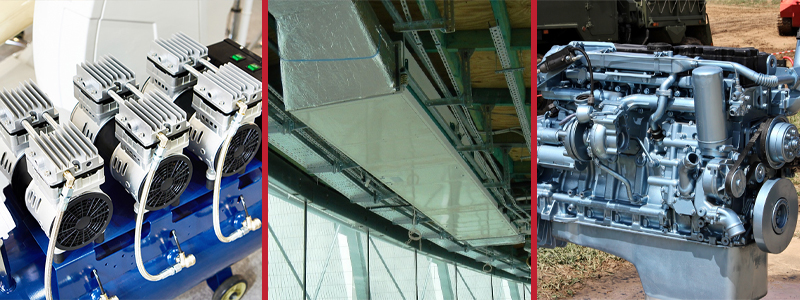In the 1990s, the use of asbestos gaskets was banned due to the toxic nature of asbestos. To fill this void, non-asbestos gaskets emerged as a safer alternative for various industrial applications. These gaskets, made from modern fibrous materials like aramid (Kevlar) and polymers, have become a trusted choice in industries such as automotive, power, and marine. Let's take a closer look at the features, composition, and benefits that make non-asbestos gaskets a reliable sealing solution.
Features that Set Non-Asbestos Gaskets Apart:
- Excellent Chemical Resistance: Non-asbestos gaskets are known for their ability to withstand exposure to a wide range of chemicals. This feature ensures they maintain their integrity and sealing performance even in challenging industrial environments.
- Wide Temperature Range: These gaskets can handle extreme temperatures, making them suitable for both high-heat and low-temperature applications. From the scorching heat of an engine to the frigid conditions of a refrigeration unit, non-asbestos gaskets have you covered.
- Resistance to Stress: Non-asbestos gaskets are designed to endure mechanical stress, ensuring they maintain their shape and sealing capabilities under pressure. This stress resistance is crucial in high-pressure systems like steam applications.
- High Joint Stability: When used in various applications, non-asbestos gaskets maintain joint stability, preventing leaks and ensuring the integrity of the system.
- Outstanding Sealing Integrity: The primary purpose of a gasket is to provide a reliable seal. Non-asbestos gaskets excel in this aspect, ensuring that fluids, gases, or other substances remain contained within the system.
- Long Lifespan: Non-asbestos gaskets are built to last, offering a prolonged lifespan compared to many other sealing options. This durability translates to cost savings for businesses over time.

Composition of Non-Asbestos Gaskets:
Non-asbestos gaskets are typically composed of two main components:
- Fibrous Material: The fibrous material used in these gaskets is often aramid, commonly known as Kevlar. Aramid is a natural material that possesses remarkable heat resistance and strength. It can be up to five times stronger than steel and twice as strong as glass fibre or nylon. Additionally, aramid fibres are resistant to absorption and organic solvents, making them ideal for various industrial applications.
- Binder Material: Elastomers like nitrile, neoprene, or EPDM rubber serve as the binder material in non-asbestos gaskets. Each elastomer offers specific advantages. For instance, aramid fibres with a nitrile binder are well-suited for applications in water and wastewater treatment, oil and gas production, food processing, pipe flange gaskets, and boiler gaskets.

Applications of Non-Asbestos Gaskets:
Non-asbestos gaskets find their use in a wide range of industrial settings, including:
- Air Compressors: These gaskets help maintain airtight seals in air compressor systems.
- Diesel Engines: In the automotive industry, non-asbestos gaskets ensure efficient sealing in diesel engines.
- Pipelines: They play a crucial role in sealing pipeline connections, and preventing leaks in oil and gas transportation.
- Marine Applications: From ship engines to offshore installations, non-asbestos gaskets are essential for marine industries.
- Power and Utility: Power plants rely on these gaskets to maintain the integrity of their systems.
- HVAC Systems: Heating, ventilation, and air conditioning systems benefit from non-asbestos gaskets to ensure airtight seals.
- Material Handling: In material handling equipment, these gaskets keep fluids and gases contained.
Our Range of Non-Asbestos Materials
We supply a wide range of materials from international and local manufacturers, including the following:
- Planichem: We are the sole UK distributor for Planichem. These asbestos-free sheets are typically composed of synthetic or elastomeric compounds, reinforced with various fillers and fibres, and manufactured using advanced techniques to achieve specific properties. View the Planichem Range
- Klinger: KLINGERSIL is a range of asbestos-free, calendared gasket sealing materials. Easy to cut, handle and fit, KLINGERSIL materials are reinforced with different fibres to meet the demands of any application. View the Klinger Range
- Latty: The LATTYgold and LATTYcarb ranges are versatile aramid-based materials, with metal or carbon reinforcements. They make an ideal general-purpose material for many applications involving all types of fluids applications including high-pressure, steam and hydrocarbons. View the Latty Range
- Garlock: Garlock Aramid Fibre sheet materials are available with a variety of binders, making them an ideal choice for general service compressed non-asbestos gaskets. View the Garlock Range
We also specify and fabricate gaskets from materials supplied by other manufacturers including the Flexitalic Novus range and the James Walker CNAF range of non-asbestos and rubber materials. For more information on non-asbestos gaskets
In conclusion, non-asbestos gaskets have proven to be a safer, stronger, and more reliable alternative to asbestos gaskets. Their excellent chemical resistance, wide temperature range, and durability make them a preferred choice in various industrial applications. Whether in engines, pipelines, or HVAC systems, non-asbestos gaskets play a vital role in maintaining system integrity and preventing leaks. With their trusted performance and adherence to industry standards, non-asbestos gaskets continue to provide sealing solutions for a wide range of industries.

